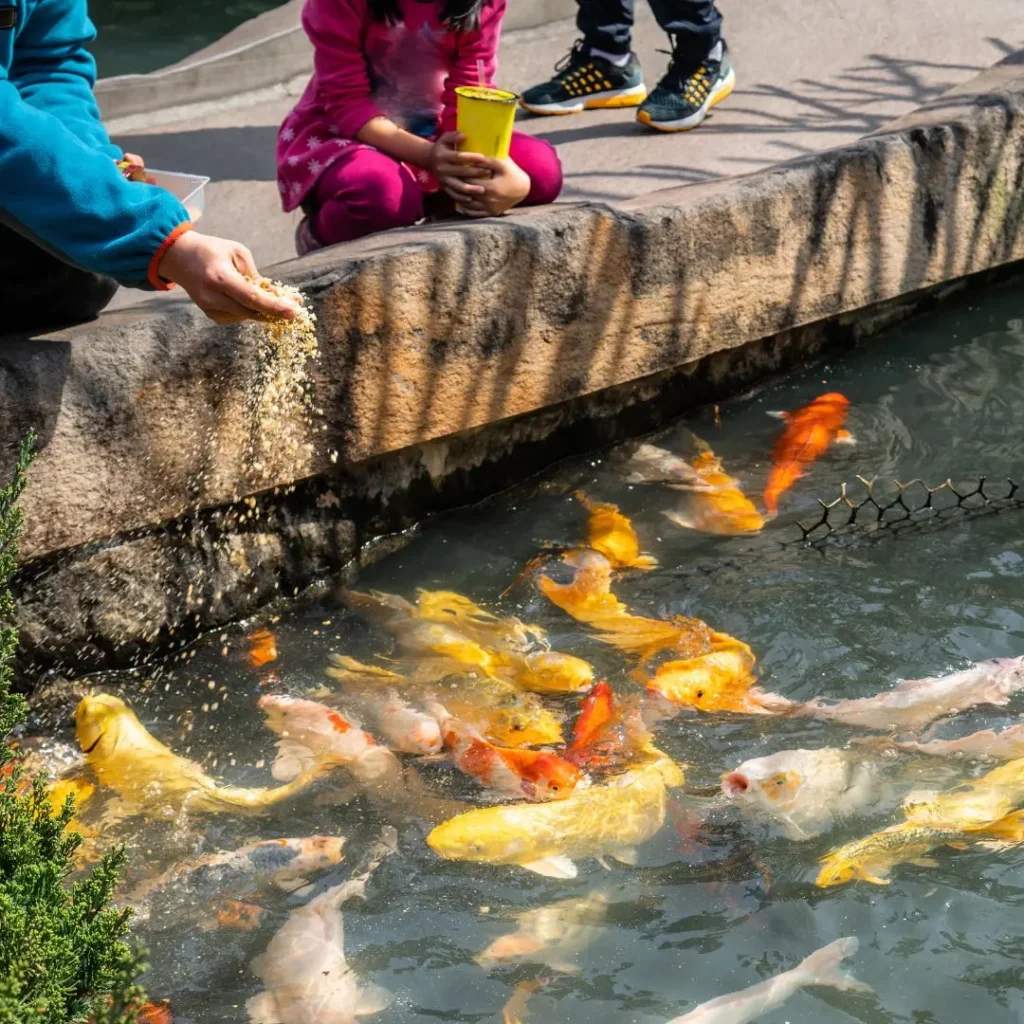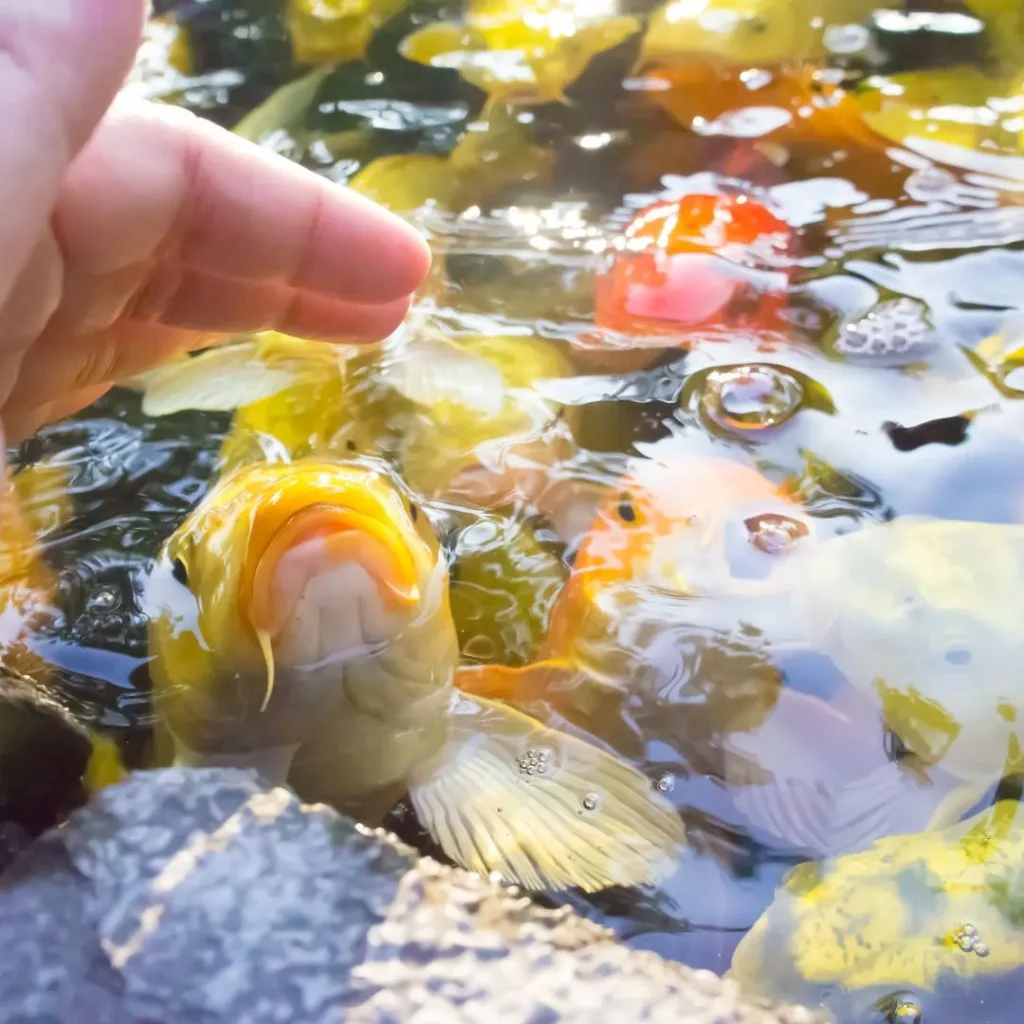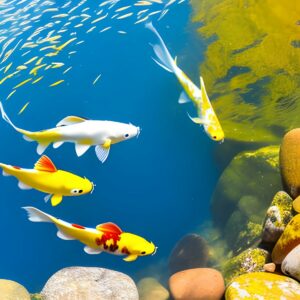Koi fish have complex personalities and behaviors that vary depending on their environment, genetics, and individual experiences. While they’re generally considered peaceful creatures, there are factors that can influence their friendliness.
In this article, we’ll dive deep into the world of koi fish, exploring the myths and realities of their temperament. We’ll examine the science behind their behavior, uncover the potential triggers for aggression, and offer tips for creating a harmonious pond environment where you and your koi can thrive.
Let’s explore koi behaviors and answer the question are koi fish friendly.
Table of Contents
Koi Fish Behavior
All types of Koi are friendly pet fish in general.
Once your Koi learn to trust you, they’ll recognize you as a food provider and can become more relaxed.
Here are some of the reasons that make Koi one of the friendliest fish to keep as pets:
- Sociable nature: Koi fish are inherently social and enjoy the company of other fish. They often form bonds with other co-inhabitants and may even recognize their humans.
- Curiosity and interaction: Koi fish can be curious and may approach humans at the pond’s edge, especially if they associate humans with feeding time. They can even get used to hand-feeding and learn to take food directly from your hand.
- Non-aggressive: Unlike other fish species, Koi are not known to be aggressive. They don’t typically attack other fish, even smaller ones, and co-exist peacefully in their pond.
What Influences Koi Fish Behavior
There are multiple factors influencing their behavior. Here are the most common examples:
- Individual personalities: Just like people, Koi fish have unique personalities, and some may be more shy or cautious than others.
However, even the shyest Koi can become familiar with humans with patience and care.
- Environment: A healthy and spacious pond with good water quality and adequate food will contribute to happy and playful Koi, who might be more open to interaction.
On the other hand, drastic and sudden water quality or temperature changes can negatively impact their behavior and overall health.
- Proper care: Regular pond maintenance, proper feeding, and avoiding overcrowding will ensure your Koi live in a stress-free environment, making them more approachable and receptive to humans.
Koi Fish Personality Traits

While attributing human personality traits to animals can be tricky, Koi fish exhibit fascinating behaviors that offer glimpses into their individualities.
Here are some of the key personality traits observed in Koi:
- Sociability
- Playfulness
- Temperament
Sociability
The sociability of Koi often relates to specific behaviors, including:
- Schooling: Koi are naturally social creatures and enjoy swimming in groups called schools. This behavior may stem from a sense of safety and camaraderie, or simply be a way to navigate their environment more effectively.
- Bonding: Some Koi form strong bonds with their tank mates, often swimming close together and even sharing meals. This suggests recognition and preference for certain individuals within the group.
- Human interaction: Koi can become surprisingly accustomed to human presence, especially if they are regularly fed by hand.
- Sound (name) recognition: Koi can learn their names and recognize sounds.
For example, they can easily recognize the sound of footsteps. Koi can associate this sound with their owners approaching.
This is why calling them out consistently by their names when approaching can indicate that they can associate their names with upcoming interactions and events.
Playfulness
- Chasing: Koi enjoy chasing each other playfully, often darting in and out of water plants or competing for food pellets. This energetic behavior demonstrates their physical agility and zest for life.
- Jumping: Koi are known for their impressive leaps, especially when startled or excited. This acrobatic feat might be a way to escape predators, reach for food, or simply express their exuberance.
- Object interaction: Koi can be quite curious about objects placed in their pond. They may nudge them with their snouts, investigate them from all angles, or even try to push them around. This playful exploration suggests an inquisitive nature and a desire to learn about their surroundings.
Temperament
- Generally peaceful: Koi are not typically aggressive fish. They rarely attack other fish, even smaller ones, and prefer to co-exist peacefully in their pond. This makes them suitable for pond communities with various fish species.
- Hierarchy formation: Within a Koi school, a dominance hierarchy may emerge, with larger or more assertive individuals taking precedence over others. This hierarchy is usually established through gentle nudges and displays rather than outright aggression.
- Individuality: Just like people, Koi have unique personalities. Some may be more bold and adventurous, while others are shy and cautious. Observing their individual quirks and preferences can be a delightful part of owning Koi.
Are Koi Fish Friendly to Humans?

Koi fish are generally considered friendly to humans. They’re not aggressive and can even be quite curious and interactive.
Of course, individual Koi fish may have different personalities, and some may be more shy or cautious than others. However, with proper care and attention, most Koi fish can become comfortable around humans and even develop a friendly bond with their owners.
Is it OK to touch Koi fish?
Whether or not it’s okay to touch Koi fish depends on several factors, and it’s best to proceed with caution and prioritize the fish’s well-being.
Here are the reasons to be cautious about touching Koi:
- Stress: Touching, especially frequent or rough handling, can be stressful for Koi. Their protective slime coat, important for fighting off infections, can be damaged by human hands.
- Injury: Jewelry, sharp nails, or rough handling can injure the Koi’s delicate scales and fins.
- Disease: Human hands can introduce harmful bacteria or parasites to the pond water, potentially endangering the Koi’s health.
However, there are some situations where gentle touching can be acceptable:
- Hand-feeding: If you hand-feed your Koi regularly, they may become accustomed to your touch and even welcome it. Use clean, wet hands, avoiding rings or sharp nails.
- Health checks: During routine pond maintenance or health checks, carefully handling the Koi for inspection or treatment may be necessary. Ensure the water is clean and minimize handling time.
- Building trust: With patience and gentle interaction, some Koi may become comfortable with being touched lightly on the side or back. Always observe their behavior and stop if they show any signs of stress.
General tips for touching Koi:
- Always wash your hands with clean, soap-free water before and after touching the Koi.
- Never use soaps, lotions, or chemicals in the pond water, as these can harm the Koi.
- Be gentle and avoid using force. If the Koi swims away, respect its wishes and do not chase it.
- Observe the Koi’s behavior. Signs of stress include erratic swimming, clamped fins, or hiding. Stop any interaction if you see these signs.
Remember: It’s best to appreciate Koi fish from a distance and limit touching to specific situations like hand-feeding or health checks. Always prioritize their well-being and avoid any actions that might cause them stress or harm.
Do Koi fish like to be petted?
While some Koi fish might tolerate gentle touches under specific circumstances, it’s inaccurate to say they “like” being petted in the same way a mammal might enjoy it.
Here’s why:
- Sensory differences: How Koi experiences touch differs greatly from how humans do. They have minimal nerve endings on their scales, so petting likely doesn’t give them any pleasurable sensation.
- Misinterpretation: Koi lacks the cognitive complexity to understand petting as a gesture of affection. They may interpret it as a strange or threatening encounter.
Do Koi Fish Love Their Owners?
Whether or not Koi fish “love” their owners the same way humans do is a complex question that scientists and animal behaviorists continue to debate.
There’s no definitive answer, as love requires a certain level of cognitive complexity and emotional depth that may not be present in fish.
However, research and observations suggest Koi can form strong bonds with their owners through positive interactions and experiences.
For instance:
- Recognition: Koi can recognize their owners, often approaching the pond’s edge when they see them, especially during feeding times. This suggests a level of familiarity and association with positive reinforcement.
- Regular interaction Interaction: Hand-feeding can create a strong bond between humans and Koi. The fish learn to associate humans with food and may even anticipate their arrival.
- Individual personalities: Some Koi appear more curious and interactive than others, possibly showing a greater preference for human interaction. This suggests individual differences in their temperament and receptivity to bonding.
Limitations and considerations:
Here are the reasons why Koi may not be able to understand the concept of love between them and their owner(s):
- Cognitive complexity: Koi fish lack the brain structures associated with complex emotions like love in humans.
Their bonding behavior may be driven by simpler mechanisms like associating with positive stimuli rather than a deep emotional attachment.
For example, there’s a higher chance Koi will ‘’love’’ their pond keepers due to treats, food, and other aspects of care.
- Instinctual responses: Some behaviors, like approaching for food, could be purely instinctual responses to cues, not necessarily evidence of love or affection.
- Anthropomorphism: It’s important to avoid projecting human emotions onto animals. We can observe their behavior and understand the potential for bonding, but attributing human-like “love” might be inaccurate.
Do Koi Fish Bite?
There’s almost no chance that a Koi fish will bite you. Despite their size and impressive teeth, they pose very little threat to humans for several reasons:
- Diet: Koi are omnivores, just like us. But since they can’t digest the food the way we do, Koi fish primarily eat algae, plant matter, and small invertebrates. So, don’t worry – you’re safe.
- Teeth location: Koi teeth are far back in their throats, almost like molars. They’re not used for biting or aggression but for grinding food like plants and insects.
- Temperament: Koi are generally peaceful fish and not known for aggression. They may become territorial with other fish during mating season, but humans are usually ignored.
- Mouth structure: Their mouths are not designed for biting. They lack sharp teeth or powerful jaws, making it impossible to cause any substantial harm to humans.
However, there are some rare scenarios where a Koi might accidentally nibble on your fingers:
- Mistaken identity: If you reach into the water with your finger extended, a hungry Koi might mistake it for food and take a quick nibble. This wouldn’t be a bite with any force, but it could feel like a slight tug.
- Feeding frenzy: In rare cases, Koi can get excited during feeding time and attempt to grab anything coming near their mouths. This is more likely when they’re kept in overcrowded ponds or fed irregularly.
When are Koi fish aggressive?
Koi fish, while generally considered friendly and docile, can exhibit aggressive behavior in certain situations. Here’s when you might see the less pleasant side of these beautiful fish:
1. Introduction of new fish: When new fish are introduced to the pond, established koi may view them as threatening their territory or resources. This can lead to chasing, nipping, and even fin-biting as they try to establish dominance.
2. Overcrowding: A cramped pond with too many koi can lead to competition for food, space, and oxygen. This stress can trigger aggression as koi become territorial and protective of their limited resources.
3. Poor water quality: Ammonia, nitrite, and nitrate build-up can irritate koi and make them more susceptible to disease. This discomfort can also manifest as aggression towards other fish or even humans.
4. Breeding season: During breeding season, male koi become more aggressive as they compete for females’ attention. They may chase and nudge females, sometimes even causing minor injuries.
5. Illness or injury: As a self-defense mechanism, sick or injured koi may feel vulnerable and lash out at other fish. Additionally, certain parasites or diseases can directly influence koi behavior and make them more aggressive.
6. Inadequate diet: Insufficient or low-quality food can cause koi to become hungry and frustrated, leading to increased aggression as they search for food and compete with other fish.
7. Handling stress: Improper handling, such as grabbing koi by the gills or fins, can be very stressful for them. This stress can manifest as aggression towards whoever is handling them or other fish in the pond.
8. Insufficient hiding places: If a pond lacks hiding places or areas of refuge, koi may feel exposed and vulnerable, leading to increased aggression as they compete for the limited cover available.
9. Predatory threats: The presence of predators, such as birds, raccoons, or even large goldfish, can trigger a defensive response in koi, making them more aggressive towards both predators and other fish in the pond.
10. Genetic predisposition: While rare, some koi breeds may have a slightly higher tendency towards aggression due to genetic factors (Doitsu koi, Chagoi koi, Ghost koi). This is something to consider when choosing your koi for the pond.
My Senior Paws is a participant in the Amazon Services LLC Associates Program, an affiliate advertising program designed to provide a means for sites to earn advertising fees by advertising and linking to Amazon.com. We also participate in other affiliate programs which compensate us for referring traffic.




